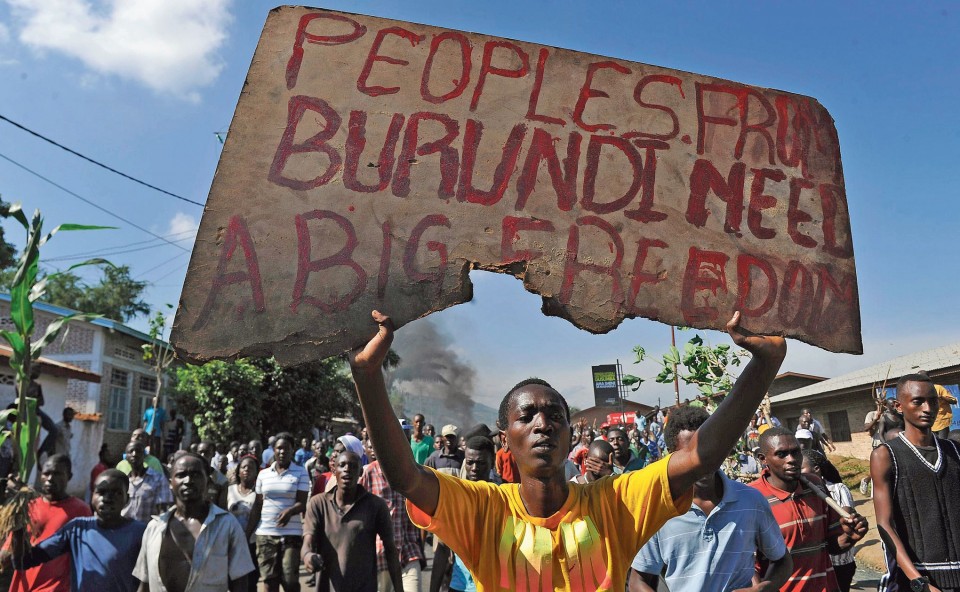"Violation of constitutional rules and disregard for 2015 presidential terms as the source of a major unresolved political crisis in Burundi"
Burundi has been experiencing a political crisis since 2015 related to the intention of the late President Pierre Nkurunziza to seek a third term contrary to the 2005 constitution and the essence of the Arusha Accords, which has plunged Burundi into a spectrum of violence and brutal repression against dissenters or those who supposedly do not support this violation of the law.
Indeed, on April 26, 2015, thousands of Burundians took to the streets of Bujumbura, Burundi's capital to peacefully protest President Pierre Nkurunziza's illegal decision to seek a third term. The repression by the forces of order was immediate and brutal.
This day marked Burundi's entry into a bloody political crisis characterized by serious human rights violations, committed overwhelmingly by Burundian security forces under orders from the authorities.
Following this situation, on April 25, 2016, the Prosecutor of the International Criminal Court (ICC), Fatou Bensouda, announced the opening of a preliminary examination on the situation that has prevailed in Burundi since April 2015. Fatou Bensouda said that her "Office has examined a number of communications and reports of killings, imprisonment, torture, rape and other forms of sexual violence, as well as cases of enforced disappearances" and added that "all of these acts appear to fall within the jurisdiction of the ICC."
In addition, the mandate of the UN Commission of Inquiry on Burundi's human rights situation has been renewed five times since 2017 and then replaced by the Special Rapporteur on human rights in 2021. The mandate of the Special Rapporteur has already been renewed once due to the recurrence of crimes of human rights violations, indicating that the political and human rights situation remains a concern of the international community.
Relying on its political and military strength, the government revised the constitution in 2018 in order to grant itself major prerogatives in the management of the country to the party that won the elections. It should be remembered that the old constitution established a mandatory sharing of power between the political parties within the government, taking into account the seats obtained in the lower house of parliament. The CNDD FDD government excludes any negotiation with the opponents in exile, which jeopardizes the hopes of repatriation of Burundian refugees, especially civil society actors, journalists and political opponents.
TLP-Burundi launches a campaign for term limits this Wednesday, April 26, 2023. This date coincides with the Commemoration of the day of April 26: "Day that marked the beginning of the bloody repression of peaceful protests against the third mandate in 2015, attacks on democracy in general and locking of the space of public freedoms.
TLP-Burundi notes that with the 2020 elections and the inauguration of President Evariste NDAYISHIMIYE, Burundi has returned to a one-party, militarized and ethnic-based government. Some authors of serious human rights violations have been promoted to positions of great responsibility in the country.
There is continuity in the political system by the same people. The judiciary is still controlled by the executive, and corruption and impunity, especially for human rights violations, are widespread.
Hate speech, manipulation and banalization of crime followed by impunity, promotion of violence and social disorder, falsification of the painful common past through the instrumentalization of the Truth and Reconciliation Commission (TRC) negatively impact democracy in Burundi.
The TLP-Burundi will :
- Produce a memorandum on the crimes and human rights violations committed in Burundi since the beginning of the political crisis of 2015 until today, show the consequences of the unstable political situation on the respect of mandate limitation and democracy in general, with a focus on the challenges, lessons learned and recommendations for the restoration of the Rule of Law;
- Analyze the ways of returning to a governance in conformity with the content of the Arusha Peace and Reconciliation Agreement for power sharing and presidential mandate limitation, capitalize on the decision of the Appeal Chamber of the Court of Justice of the East African Community (EAC) on the illegality of the third mandate of the late President Pierre Nkurunziza;
- Inform and raise awareness of national and international opinion through the media and the social networks on the major developments of the political crisis since the beginning of the political demonstrations dated April 26, 2015 to date, publish the memorandum produced;
- Conduct advocacy actions with the institutions of the European Union, international organizations and ambassadors working in the field and other key partners of Burundi for the immediate resumption of negotiations between the Government of Burundi and civil society in exile, political parties in exile, political parties of the opposition in the interior and the guarantors of the Arusha Agreements in order to bring Burundi back on the track of peace, justice and the rule of law
TLP-Burundi invites its members, partners and all member coalitions of " Tournons La Page International " to bring their support to this campaign.














